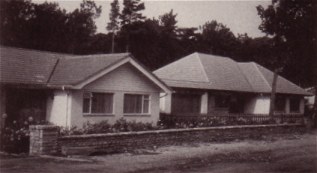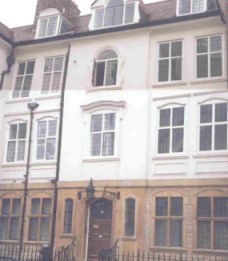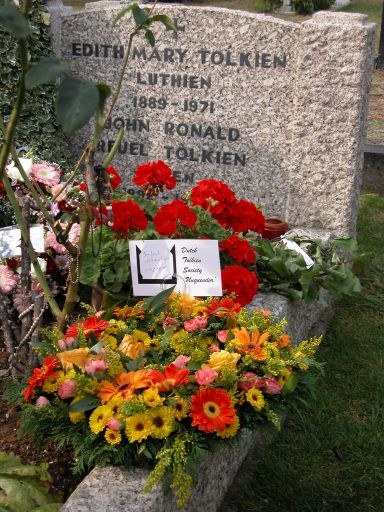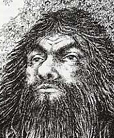Sailing to Valinor
As Tolkien became older, he became deeply saddened by his waning powers. In 1965 he wrote:
“I find it difficult to work – beginning to feel old and the fire dying down”
Occasionally this plunged him into depression, and he became prone to gloom. Some of his more unique characteristics also became more marked – he began to speak very hastily, with bad articulation and parathetic sentences. He started making dogmatic assertions about subjects which he knew nothing about, and his phobias became much more marked.
However, his capacity for enjoying the company of others seemed to increase with age, and he remained a congenial companion to the end. As CS Lewis wrote later in his obituary: “He was a man of ‘cronies’ and was always best in some small circle of intimates where the tone was at once Bohemian, literary and Christian.”

In 1959, Tolkien retired from the Merton Professorship, and in the most part, removed himself from the reach of his circle of friends. He still saw a little of CS Lewis, and some of their old friendship might have endured except for his puzzlement and anger about Lewis’s marriage to Joy Davidman. He felt betrayed by the intrusion of a woman into his male circle of friends – and a divorced woman at that. The end of his regular meetings with Lewis in the mid 1950s marked his transition away from a sociable, friends-orientated man into one who was deliberately withdrawn from his friends, concentrating instead on Edith.
From then on, he was essentially apart from male company, living his life mainly at home. He consciously withdrew from Oxford society and the new generation of academics, who Tolkien considered less sociable and less Christian. His university contacts became restricted to occasional visits from Alistair Campbell – an Anglo-Saxon scholar – and lunches with Norman Davis, a former pupil and the new Merton Professor of English Language and Literature.
Exeter College elected Tolkien to an Honorary Fellowship in 1963, and Merton quickly followed suit with an Emeritus Fellowship. However, Tolkien rarely attended a college dinner, and when he did, he ate sparingly, suspecting the worst of the cooking. He also refused to leave Edith on her own for the evening, only going out when a friend could stay with her. He had become concerned for Edith’s health and felt it his duty to be with her as much as possible as she was increasingly more lame, and suffered from constant digestive trouble.
Tolkien decided to complete “The Silmarillion” – but immediately decided that the whole work needed to be reconstructed. Luckily, he had his part-time secretary, Elisabeth Lumsden, to help him with the great undertaking.
But unluckily, he had constant interruptions – including the proofs for the “Ancrene Wisse”; his revision and introduction for “Gawain” and “Pearl”; his revision of his fairy-story lecture, which Allen & Unwin wanted to publish with “Leaf by Niggle”; and answering every single fan letter he received. He also played patience constantly, even inventing varieties of his own.
However, Tolkien was often saddened by the way his life was now going, without the companionship of friends and the hustle and bustle of academia.
“These days seem blank, and I cannot concentrate on anything. I find life such a bore in this imprisonment.”
Was this Tolkien’s purgatory? The sacrifice of the end of his life for Edith’s health and happiness – in the same way she had sacrificed much of her own life for him? He particularly missed male companionship, and the talks he had with an old friend, RE Harvard, after church each week became an important event in his week.
And then his friends started to fail, and on the 22nd November 1963, CS Lewis died, aged 64. To Priscilla, Tolkien wrote: “This feels like an axe-blow near the roots.”
Soon after Lewis’s death, Tolkien started writing a diary again, in a new language – his “new English alphabet”, a mixture of conventional letter forms, phonetic signs, and Fëanorian signs. He also started to write “Smith of Wootton Major”, into which bled his anxiety over the future and the growing grief at the approach of old age.
“Smith of Wootton Major”
“Smith of Wootton Major” started life as a short story Tolkien created to illustrate a preface that he was writing for a new edition of George Macdonald’s “The Golden Key”. In this, he had started to discuss the meaning of the term ‘fairy’, and illustrated his arguments with a short story called “The Great Cake”. The preface was never finished, but “Smith of Wootton Major” was born.
The story was close to Tolkien’s heart. He called it an old man’s story, written with deep emotion and relying partly on the experience of the sadness and loss involved in retirement and advancing age. Like Smith, Tolkien had wandered far through mysterious lands, but now he had come to rest. “Smith of Wootton Major” was the last story he ever wrote from scratch, and its opening lines were poignant: “There was a village once, not very long ago for those with long memories nor very far away for those with long legs.” Was this Tolkien’s farewell to his beloved Sarehole?
In 1967, “Smith of Wootton Major” was published in the UK and the US, with the book being illustrated by Pauline Baynes. At that time, Tolkien managed to complete two other books for publication – “The Adventures of Tom Bombadil” and “Tree and Leaf” (containing “On Fairy-Stories” and “Leaf by Niggle”). The Bombadil book was written as his aunt Jane Neave had asked him for a small book containing her favourite character. Most of the verses contained within it were written in the 1920s – 1930s, though “Bombadil Goes A-Boating” was written just for the book, and “Cat” was written in 1956 to amuse Michael’s daughter, Joan Anne.
Finances
For the first time in his life, Tolkien was well-off, but he still watched every penny, recording all cash spent in his diary. He didn’t spend money carelessly, but was generous to his family and his parish church in Headington. Late in his life, he made a financial settlement that passed on most of his assets to his children, though he still retained enough for a few selected extravagances – including fine lunches in Oxford and quality clothing for himself and Edith.
Bournemouth
While Tolkien and Edith were still very different people, with different interests, there remained a great deal of love and affection between them – especially now the strain of bringing up a family was over. There was time to sit, and talk, and be silent together. In 1966, it was their Golden Wedding, which was celebrated with much pomp and ceremony with a party at Merton.
Their house in Headington was becoming less and less acceptable to the Tolkiens. Edith could no longer cope with all the housework that needed to be done there, and Tolkien found it inamicable to his writing practices.
“My present house and its location were forced on me by necessity; few even of its furnishings afford me any pleasure. I am caught here in acute discomfort; but the dislocation of a removal and the rearrangement of my effects cannot be contemplated, until I have completed my contracted work. When and if I do so, if I am still in health, I hope to go far away to an address that will appear in no directory or reference book.”

Edith had been taking holidays in Bournemouth several years, and she had made herself a large number of friends there. After accompanying her on several of these holidays, Tolkien came to realise that she was happiest there, on the south coast by the sea. So in 1968, when Tolkien was 76 and Edith was 79, they decided to move to a more convenient house in Bournemouth, at 19, Lakeside Road. This was a plain modern house, with a well-equipped kitchen that Edith could easily manage. There was a study, a garage which served as a library / office, a verandah and garden, and a private gate leading to Branksome Chine and the sea. There was also central heating – a first for the family. They had regular domestic help, and Catholic neighbours took Tolkien to church with them in their car.
They spent a lot of time at the Miramar – the hotel where Edith had stayed on her holidays. It was an expensive hotel, but comfortable, and patronised by people similar to the Tolkiens. The social setting of the Miramir was much as Edith had been used to in Cheltenham, being full of upper middle class clients, affluent, unintellectual and possessed of an easy friendliness. The hotel increasingly became an ideal answer to the Tolkiens’ domestic issues, as when the strain of keeping house (or not getting work done on Tolkien’s side) became too much, they would hire their usual hire-car driver to take them to the Miramar.
Unlike Edith, Tolkien did not much enjoy his time at the Miramar, and only occasionally did he find an articulate male among the guests. The move to Bournemouth had involved a good deal of sacrifice on his part – he had little wish to leave Oxford, and by moving he had cut himself off even further from friends and family. But he felt it was worth it – Edith’s happiness was deeply gratifying to him, and indeed, this was reflected in his own state of mind. He had frequent visits from those dear to him, and he gained an almost total lack of interruption from his fans. He had secretarial help from his doctor’s wife, and Joy Hill from Allen & Unwin dealt with his fan mail.

Tolkien started work again on “The Silmarillion”. But his various alterations and rewritings over the years had produced a massive confusion of detail, and he was often no longer sure which manuscript represented his latest thoughts on a particular passage. He also had a new task – to make sure every detail meshed perfectly with “The Lord of the Rings”. Slowly, Tolkien began to make some progress, though more often than not, he worked on ancillary essays rather than the actual book.
The family’s time in Bournemouth came to an abrupt end in 1971, when Edith was taken ill in mid November with an inflamed gallbladder. She was taken to hospital, and after a few days of severe illness, she died, aged 82. It was Monday, 29th November, 1971.
He wrote to William Cater (a journalist from the Sunday Times):
“I am grieved to tell you that my wife died this morning. Her courage and determination … carried her through to what seemed the brink of recovery, but a sudden relapse occurred which she fought for nearly three days in vain. She died at last in peace.
I am utterly bereaved, and cannot yet lift up heart, but my family is gathering round me and many friends.”
And in another letter, a few months later, to Michael:
“Since I came of age, and our 3 years separation was ended, we had shared all joys and griefs, and all opinions (in agreement or otherwise), so that I still often find myself thinking ‘I must tell E. about this’ – and then suddenly I feel like a castaway left on a barren island under a heedless sky after the loss of a great ship.
…
But now she has gone before Beren, leaving him indeed one-handed, but he had no power to move the inexorable Mandos, and there is no Dor Gyrth i chuinar, the Land of the Dead that Live, in this Fallen Kingdom of Arda, where the servants of Morgoth are worshipped …..”
Even though Tolkien was shocked and numb after the death of his beloved Edith, he soon realised that he wanted to go back to Oxford. Merton invited him to become a resident Honorary Fellow and offered him a set of rooms in a college house in 21, Merton Street – with a scout and his wife to look after him. He moved there at the beginning of March, 1972. His rooms consisted of a sitting room, bedroom and bathroom, while his scout, Charlie Carr, lived in the basement with his wife. They showed great kindness to Tolkien, bringing him breakfast in his rooms, and also cooking lunch and supper for him if he didn’t feel well, or didn’t wish to dine in College.

While he had suffered greatly at the loss of Edith, his way of life in 1972 – 1973 was actually rather to his liking. He was essentially a loner, and now he was more free than he had been in many a year. He made frequent visits to Christopher, in his house in a village near Oxford where he lived with his second wife, Baillie, and their children, Adam and Rachel. He went with Priscilla and his grandson Simon to Sidmouth for a holiday. He visited Christopher Wiseman, and spent several weeks with John at his parish in Stoke-on-Trent. While there, the two of them visited Hilary.
Tolkien also found that he was still having honours piled onto him. He received a number of invitations to visit American universities to collect doctorates, but at no time did he feel that he could face the journey. However, in June 1972, he was made an honorary Doctor of Letters at Oxford for his contribution to philology, and in June 1973, he visited Edinburgh to receive an honorary degree. In 1972, he also received a CBE.
Sailing to Valinor
In late 1972, Tolkien started suffering from severe indigestion, and by 1973, many close to him thought that he was ageing fast. On the 30th August 1973, he travelled to Bournemouth to stay with his old doctor, Denis Tolhurst, and his wife Jocelyn, who had been a part-time secretary for him while he and Edith were living in on the south coast. That day, he joined in the celebrations for Jocelyn’s birthday, but felt unwell and on the 31st August, he was taken to a private hospital where he was diagnosed with an acute bleeding gastric ulcer. John and Priscilla came down to visit him, but Michael and Christopher were unable to be there, being in Switzerland and France respectively. By the next day, a chest infection had developed, and Tolkien died in the early morning of the 2nd September, 1973. He was 81.
Both Tolkien and Edith were buried at Wolvercote Cemetary, with their simple memorial being made of a grey slab of Cornish granite. The wording read:
“Edith Mary Tolkien, Lúthien, 1889 – 1971
John Ronald Reuel Tolkien, Beren, 1892 – 1973″










